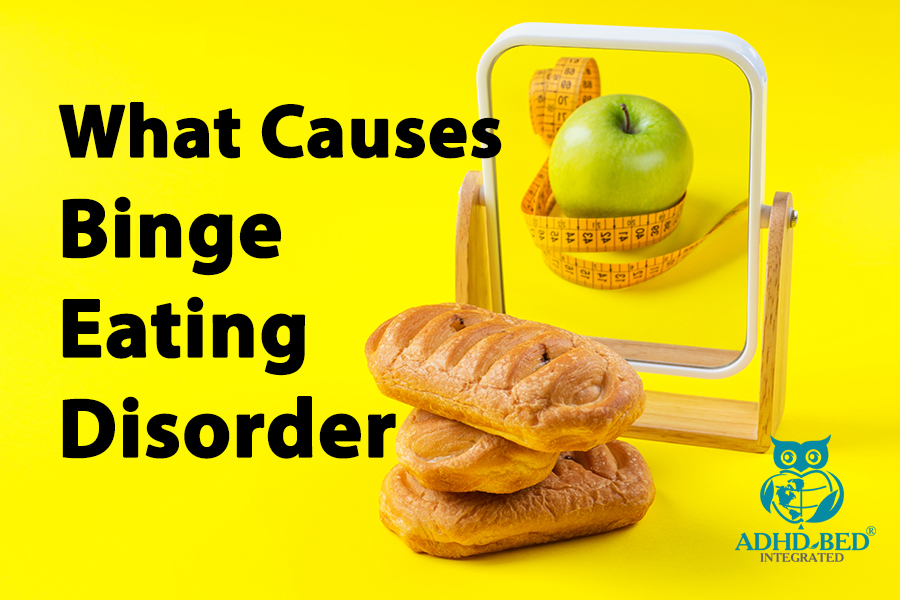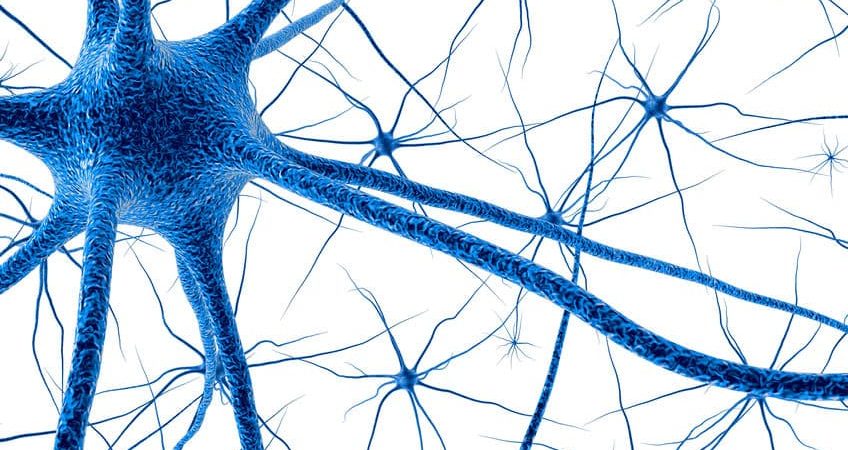Table of Contents
Introduction
Binge Eating Disorder (BED) is the most commonly diagnosed eating disorder, affecting around 2 to 3% of the population. It is a detrimental psychiatric disorder, involving recurrent periods of binge-eating characterised by trance-like episodes of eating and consuming abnormally excessive amounts of food.
While overeating may be considered normal from time-to-time, BED involves an excessive and recurring frequency of overeating, as well as other features like a deep sense of guilt or shame and feeling a lack of control over their behaviour during a binge-eating episode. For patients with BED, this can lead to high levels of psychological distress. Unlike other eating disorders, BED typically does not involve compensatory behaviours like purging or over-exercising.
This article aims to introduce possible causes and risk factors associated with developing BED. It is highly important to understand the underlying causes of BED as it has great implications towards the types of treatment methods and prevention strategies that are used for BED.
Signs and Symptoms of Binge Eating Disorder
1. Binge Eating and Other Abnormal Eating Habits. Abnormal eating behaviours include eating more rapidly than normal, eating until uncomfortably full, eating large amounts of food even when not feeling hungry, eating alone due to feeling embrassed, and a feeling guilt or disgust with oneself after binge-eating.
2. Extreme Scrutiny Over Body Weight, Shape and Image. Patients of BED typically have a very low self-esteem and are highly insecure of their own body. This can manifest in behaviours like constantly looking at their reflection in the mirror and can further drive binge-eating habits.
3. Fear of Eating Around Others or In Public. BED patients tend to be afraid of others judging the amount of food they are consuming. This results in behaviours like secretly hiding or hoarding food in odd places and eating alone.
4. Feeling a Lack of Control. People with BED tend to feel like they are unable to stop eating due to this lack of control with their own behaviour. This further spirals into extreme negative emotions regarding their inability to stop their binging.
5. Feeling a Sense of Disgust, Shame or Guilt For Oneself. Stemming from feeling a lack of control over their own behaviour, patients will typically have binge-eating episodes in secret and then feel ashamed, guilty or embarrassed either during the episode or after.
6. Social Withdrawal. Rooted in their fear of eating in public or in front of others, as well as the sense of shame anf disgust for themelves, BED patients tend to withdraw socially and distance themselves from their family and friends.
7. Frequent Dieting. A common sign that someone could be struggling with BED is the act of abusing dietary regimens. This behaviour manifests in frequent and excessive dieting, which typically involves drastic dieting habits like fasting or completely cutting out major food groups all at once (e.g., no sugar, carbs, dairy, etc.).
8. Difficulties in Concentrating. Someone with BED may be too occupied with the overwhelming thoughts of a negative self-image, body weight and shape, and binging. This results in the inability to focus and contentrate well, and vice versa: poor concentration and boredom, when attending to tedious tasks, lead to exessive eating and bingeing on food.
9. Gastrointestinal Issues. The unhealthy nature of binge-eating behaviour can be harmful towards the gastrointestinal system, leading to symptoms like stomach cramping, acid reflux, constipation, etc.
10. Fluctuation in Weight. While weight gain and obesity is commonly associated with BED, patients with BED can also drastically lose weight and become malnourished. Fluctuations in weight, both ways, is a classic sign of BED.
How to Know If You Have Binge Eating Disorder – The Diagnostic Criteria
Binge Eating Disorder (BED) is typically diagnosed through a comprehensive evaluation by a licensed medical professional, based on the diagnostic guidelines provided by the fifth edition of the Diagnostic and Statistical Manual of Mental Disorders (DSM-V).
The DSM-V states that a diagnosis of BED would require that patient has recurrent binge-eating episodes involving eating excessive amounts of food that is abnormal for the average person within a discrete a period of time. These binge-eating episodes must occur at least one day a week, and have been occuring for at least a duration of 3 months.
The binge-eating episodes must also be associated with at least three of the following:
- Eating more rapidly than normal
- Eating until uncomfortably full
- Eating large amounts of food, even when not feeling hungry
- Eating alone due to embarassment of how much food they are eating
- Feeling depressed, guilty or disgusted with oneself after overeating
Furthermore, the patient must not regularly perform any compensatory behaviours like purging (i.e. self-induced vomiting), inappropriate fasting or excessively exercising.
5 Possible Causes and Risk Factors of BED
1. Neurobiology of BED
There are currently no clear and direct causes of BED. However, it is known that BED has a strong neurobiological basis, which means that it is a disorder underpinned by deficits within the structure and function of the brain.
Structurally, BED can be attributed to neurocognitive impairments and functional alterations in the parts of the brain that are in charge of executive functioning – particularly impulse control, response inhibition and attentional control. Research has suggested that impaired impulse control can be linked to the inability to control eating behaviour, leading to binge-eating.
Moreover, the impairments seen in BED can also stem from an abnormal deficiency in a chemical called dopamine. Dopamine is a neurotransmitter responsible for the brain’s reward processing system and is released when a person has pleasurable experiences. Abnormally low levels in dopamine release may result in unnatural neurological pathways for immediate pleasure, leaving a person more susceptible to impulsive behaviours like binge-eating.
On top of this, research has found various risk factors that may cause BED and increase the chances of someone developing BED.
2. Genetics
Genetics plays a role as a risk factor towards developing BED. This is because BED can be inherited, which means if a parent experiences binge-eating behaviours or has been diagnosed with BED, it is possible that their child would have BED and/or any other disorders linked to disordered eating or poor impulse control.
If someone in your family has been diagnosed with BED or experiences symptoms of binge-eating, it may be worthwhile to seek appropriate advice and help, especially if you are experiencing similar symptoms yourself.
3. Psychological Factors
There are a few psychological risk factors that increases the vulnerability of someone having symptoms of BED.
Research has shown that BED has a high level of psychiatric comorbidities. This means that it is highly common for BED to occur alongside other psychiatric conditions, particularly mood disorders (i.e., depression), anxiety disorders (i.e., anxiety) and developmental disorders (i.e., Attention Deficit Hyperactivity Disorder). Studies have found that people with depression, for example, are more likely to also experience symptoms of binge-eating.
Furthermore, people who tend to have lower self esteem, negative self-evaluation and high body dissatisfaction tend to be more likely to develop BED. Furthermore, traits like high neuroticism and impulsiveness are associated with the development of BED.
4. Environmental Factors
Certain environmental factors increase the risk of someone developing BED.
Firstly, familial environment can play a role. Specifically, hostile familial environments like parental separation, high parental expectations and exposure to parents’ own eating problems or disorder can further drive the likeliness of developing BED symptoms.
Secondly, societal pressures in the form of weight-related pressures can be very harmful towards one’s mental heealth. Diet culture, weight-teasing or body shaming amongst peers may lead to harmful thoughts about one’s body and self-image.
Lastly, trauma from stressful life events like death, bullying, any form of abuse, a breakup, etc. may promote the usage of food as a coping mechanism, which can lead to the harmful cycle of feeling guilty for over-eating and losing control.
5. Dieting and Restrictive Eating
A person who strictly practices unhealthy dieting regimens like restrictive eating or cutting out major food groups is very likely to develop BED.
A common sign that someone could be struggling with BED is the act of abusing dietary regimens. This behaviour manifests in frequent and excessive dieting, which typically involves drastic dieting habits like fasting or completely cutting out major food groups all at once (e.g., no sugar, carbs, dairy, etc.). Often times, these strict diets will fail and lead to major feelings of guilt and shame. This will likely lead to further bingeing as a coping strategy for their negative beliefs.
Conclusion
Binge Eating Disorder (BED) is a very commonly diagnosed psychiatric disorder. People who experience binge-eating tend to struggle with their physical and mental health.
While there are no known direct causes of BED, research has suggested a few plausible causes and risk factors towards developing BED. These factors include neurobiological deficits in brain structure and function, genetics, psychological traits and psychiatric comorbidities, environmental influences within family and society, as well as stringent dieting and restrictive eating.
Understanding the causes and risk factors of BED plays an important role in the implementation of effective treatment plans and prevention strategies. If you, or a loved one, are experiencing any known symptoms of BED or are known to be vulnerable to the above risk factors, it is crucial to seek professional help and advice.
References
American Psychiatric Association. (2022). Diagnostic and statistical manual of mental disorders (5th ed., text rev.). doi.org/10.1176/appi.books.9780890425787
Berkman, N. D., Brownley, K. A., Peat, C. M., Lohr, K. N., Cullen, K. E., Morgan, L. C., … & Bulik, C. M. (2015). Management and outcomes of binge-eating disorder [Internet].
Hilbert, A. (2018). Binge-Eating Disorder. Psychiatric Clinics of North America. doi:10.1016/j.psc.2018.10.011
Giel, K. E., Bulik, C. M., Fernandez-Aranda, F., Hay, P., Keski-Rahkonen, A., Schag, K., … & Zipfel, S. (2022). Binge eating disorder. Nature Reviews Disease Primers, 8(1), 16. https://doi.org/10.1038/s41572-022-00344-y
Agüera, Z., Lozano-Madrid, M., Mallorquí-Bagué, N., Jiménez-Murcia, S., Menchón, J. M., & Fernández-Aranda, F. (2020). A review of binge eating disorder and obesity. Neuropsychiatrie. doi:10.1007/s40211-020-00346-w
Olguin, P., Fuentes, M., Gabler, G., Guerdjikova, A. I., Keck, P. E., & McElroy, S. L. (2016). Medical comorbidity of binge eating disorder. Eating and Weight Disorders – Studies on Anorexia, Bulimia and Obesity, 22(1), 13–26. doi:10.1007/s40519-016-0313-5
Citrome, L. (2019). Binge eating disorder revisited: What’s new, what’s different, what’s next. CNS Spectrums, 24(S1), 4-13. doi:10.1017/S1092852919001032



